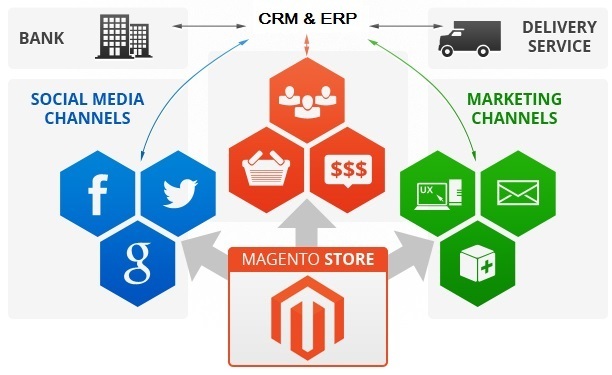Magento and ERP
Magento has become one of the leading platforms of Content Management Systems (CMS) offering an open source platform that attracts high interest among ecommerce business enterprises and online developers around the world as it continuously boosts its standing in the market.

Undoubtedly the massive list of features and amazing benefits Magento provides helped its continuous growth, interest and preference among online businesses.
Highly flexible, Magento has designed customized functions to provide any kind or type of business whether big or small all the necessary means to build and develop an online business. At the same time it has the ability to integrate with other applications to help properly manage, increase efficiency, improve customer service, increase sales and profits of an online enterprise.
Some Basic Features of Magento
Flexible - Highly adaptable to the needs and requirements of any type or size of any online business
Structure – Well developed and well built, designed to customize and accommodate any need of an e-commerce business
Open Source – It provides an open source platform. Free from licensing fees, just download and install
Mobile – Provide a mobile friendly system
Fast – Real time accessibility features
Extensions – An important feature that provides easy integration of extensions / applications needed to increase potential of its use required to properly manage each business
Other features are concerned with:
- Customer Accounts
- Customer Service
- Product browsing
- Catalogue Browsing and Management
- Language and Currency Support
- Order Management
- Payment
- Shipping
- Analysis and Reporting
Enterprise Resource Planning (ERP)
ERP is a business management software application integrated in a business to properly help manage business and operation activities by gathering, storing, analyzing and interpreting data.
There are many ERP applications available in the market designed to integrate and work well with Magento. These are able to cover major processes of a company from planning, manufacturing, inventory management, marketing, shipping, payment, supplier management and sharing of data and information with all pertinent departments.
Having an integrated system helps organise and improve the management of a business with access and means to take advantage of benefits from the latest technology and the latest development in ERP.
Benefits
Unfulfilled orders due to poor sales and inventory management will be a thing of the past. Imagine real time data and updates directly provided by your ERP system. It can provide correct inventory and shows the right information to customers. These can track items, cash, raw materials, supplies, orders, production, purchase orders, payrolls, shipping, etc.
eCommerce businesses with the Magento - ERP system give business owners and management better control of their business. Having automated parts of the system reduces human involvement, data redundancy, errors, improper inventory, removing unnecessary equations and costs in the operations. By streamlining the processes the owners can properly manage business operations with direct real time communication and sharing of information in warehouses and different departments. Having proper sales information and updated inventory information, product availability, details and tracking information readily available on hand increase productivity, and efficiency give e-commerce better customer service and increase customer satisfaction that eventually leads to increase in sales, favourable growth and better financial report.
Stock Management
The Magento-ERP integration can help manage multiple warehouses even in different locations in real time and can maintain separate stocks for your stores and online store. It provides selection settings to provide options to distribute stocks to locations and to different designated warehouses to properly manage stocks in your operation.
Stock Movement
It has the means to properly track the movement of items in your distribution line, and at the same time defines and provides the reason of the stock movement be it through purchase order, delivery, refund, or any other designated reason that organize inventory and help prevent errors.
Stock Level Notification
It can create an algorithm for a stock level of any item which is based on its sales history. This will help determine the low stock level alert of an item that needs to be replenished.
Barcodes
It assigns barcodes to your products that can help to automatically identify items. This enables your products to be moved in a much faster and efficient manner especially with handheld scanners for inventory, pick-ups and delivery operations.
Purchasing
There is better control over supplier data base, supplier product association and others. It can automatically update the products needed to be purchased and help monitor the minimum and maximum levels required of a product.
It also provides clear information on the quantity, currency, unit price, landing cost, tax rates, its packaging and estimated delivery of an item. The important information provided helps to properly manage your purchase orders efficiently and at the right time.
Order Management
It manages your supply chain. When an order is made it knows which are available on stock, on reserve, out of stock and it can also provide customers the exact information and inventory available. It features a mass order management where it provides a process that efficiently fills several orders at the same time. It can also have the ability to communicate with shipping software and shipping carriers that helps coordinate and update information which are appreciated by clients.
